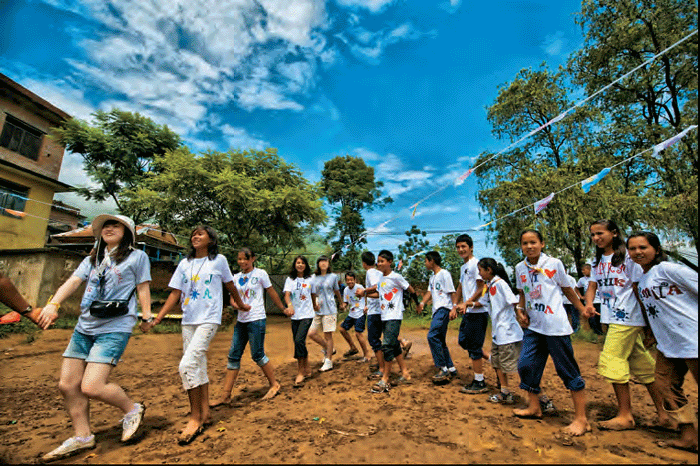International Relations
South Korea strives to promote friendly and cooperative relations with other countries. As of June 2020, South Korea maintains diplomatic relations in 191 countries in total. Among them, the government manages 115 resident embassies, 5 permanent missions, and 46 consulate generals. The consulate general provides consular services in a country where the embassy is established. The permanent mission serves to assist in the realization of the purposes and principles of the international organizations. In addition, 42 Korean Cultural Centers are operated in 32 countries to promote South Korean culture.
South Korea is committed to carrying out positive activities as a member of diverse international organizations such as UNESCO, IMF, APEC, IAEA, ILO, WHO. South Korea became a member of the UN in 1991, and joined the OECD in 1996. The country has also engaged in various activities as a member of the IOC since 1947.

South Koreans serve the world as members of the international community through international cooperation carried out at the government level and through private organizations’ voluntary activities.
South Korea serves as a member of the international community through international cooperation carried out at the government level and through voluntary activities by private organizations. (Photo: South Korean COPION volunteers with locals in Kathmandu, Nepal)
International Cooperation
South Korea does its best in the sector of international cooperation in keeping with its enhanced economic strength. The country takes part in programs designed to provide support for impoverished countries through the World Bank, the IMF, and the OECD. Recently, the country has also joined worldwide efforts for peacekeeping, global economic stabilization, environmental conservation in response to global warming, etc.
South Korea chaired the G20 Summit held in Seoul in November 2010, confirming its status as a leading country, under the slogan “Shared Growth Beyond Crisis.” Observers said that the country dealt very efficiently with foreign exchange issues, the core agenda during the global economic crisis.
The Nuclear Security Summit Seoul 2012 was another event that showed the status of South Korea playing a key role in the struggle for world peace. 53 world leaders and 4 heads of international organizations participated in the summit to discuss measures for further strengthening international cooperation to block nuclear terrorism.
In December 2014, the ASEAN-ROK Commemorative Summit was held in Busan. This summit was intended to further deepen trust and partnership between the Republic of Korea and the Association of Southeast Asian Nations (ASEAN), commemorating the 25th anniversary of ASEAN–ROK dialogue relations. As a follow-up to the summit, the ASEAN Culture House opened in September 2017 in Haeundae-gu, Busan.
South Korea is enhancing its reputation in the international community by achieving notable results in the green growth sector. The country has hosted the UN Green Climate Fund (GCF) designed to limit or reduce greenhouse gas (GHG) emissions in developing countries, and to help vulnerable societies adapt to the unavoidable impacts of climate change. In addition, the Global Green Growth Institute (GGGI) is also headquartered in Seoul.
Provision of Support for Developing Countries
The 4th High Level Forum on Aid Effectiveness, the largest-scale international meeting in the development and cooperation sector, was held in November 2011 in Busan, the second largest city of South Korea. This showed the phenomenal success story of South Korea which transformed itself in only half a century from one of the most impoverished countries in the world into a donor capable of providing aid to other countries.
South Korea’s foreign aid programs are coordinated by the Korea International Cooperation Agency (KOICA). Since its establishment in 1991, this agency has fulfilled a variety of programs designed to provide support for developing countries, thereby increasing global understanding and awareness of South Korea. KOICA provides ODA (Official Development Assistance) of USD 400–500 million annually for developing countries in Asia and Africa; these funds contribute to numerous areas including education, health, agriculture/forestry/ fisheries, public administration, and industrial energy, among others.
South Korea is also willing to make a great contribution to world peace and security through participation in a wide range of UN peacekeeping operations and support for the UN peacekeeping budget. Currently, South Korean troops are stationed in eight countries including Lebanon, South Sudan, India, Pakistan, and Western Sahara, where they are tasked with maintaining order, rehabilitation, medical services, and other activities.
Inter-Korean Relations
An Audacious Initiative
President Yoon Suk Yeol on Aug. 15, 2022, proposed an "audacious initiative" to North Korea.
In a celebratory speech he gave to mark the 77th National Liberation Day, he said, "Denuclearization of North Korea is essential for sustainable peace on the Korean Peninsula, in Northeast Asia and around the world," adding, "The audacious initiative that I envision will significantly improve North Korea’s economy and its people’s livelihoods in stages if the North ceases the development of its nuclear program and embarks on a genuine and substantive process for denuclearization."
"We will implement a large-scale food program; provide assistance for power generation, transmission and distribution infrastructure; and carry out projects to modernize ports and airports for international trade. We will also help enhance North Korea’s agricultural productivity, offer assistance to modernize hospitals and medical infrastructure, and implement international investment and financial support initiatives."
President Yoon specified the "audacious initiative" he mentioned on May 10, 2022, in his inauguration speech, pledging a step-by-step plan for economic cooperation with the North based on Pyeongyang taking measures toward "practical denuclearization."
